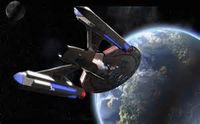Luna Ops Section: Difference between revisions
m (→Tractor Array) |
m (→Life Support) |
||
| Line 99: | Line 99: | ||
== Life Support == | == Life Support == | ||
Life support systems are the most crucial aboard any space vehicle. They typically include artificial gravity, | Life support systems are the most crucial aboard any space vehicle. They typically include artificial gravity, inertial dampers and atmospheric controls. Failure of these systems prompts a computer safeguard to order the evacuation of the starship in question. Aboard some vessels the imminent failure of the life support system constitutes a blue alert situation. | ||
== Waste Management == | == Waste Management == | ||
Revision as of 21:04, 14 November 2013
| USS Avandar | ||
|---|---|---|
 INACTIVE STATUS | ||
| ||
The ops position on the bridge is typically manned by a member of the command staff of a starship, regardless of seniority.
Chief Operations Officer
As analytical operations rely upon knowledge of science and engineering disciplines, Chief Operations Officers sometimes perform the additional duties of a Science Officer.
Operations Office
The office is used by the Operations Officer for working on ship problems. It is located on Deck 5 in the ship's Operations Center.
Transporters
Transporters come under the command of the Operations Officer.
Transporter Rooms
A transporter room is part of a starship or space station which is specially outfitted to transport lifeforms and small, inanimate objects.
Transporter Room 1 is on Deck 4.
Transporter Rooms 2 and 3 are on Deck 7.
Transporter Room 4 is on Deck 12.
Each deck has one emergency transporter.
Tech Information
Personal Transporters: 4 Type 7/I - standard 6-pad; range 40,000 km
Emergency Transporters: 18 Type 3/I - emergency 3-pad (send only); range 15,000 km
Cargo Transporter: 3 Type 7/I - 500 kg; range 40,000 km
Holodecks
The holodecks fall under the command of the Operation Officer. A holodeck is a form of holotechnology designed and used by Starfleet. They are installed aboard starships, space stations, and at Starfleet institutions for entertainment and training purposes. A typical holodeck consists of a room equipped with a hologrid containing omnidirectional holographic diodes enabling holographic projections through the manipulation of photons contained within force fields. There are six holodecks on a Luna class starship.
Holodecks 1 and 2 are on Deck 2.
Holodecks 3 and 4 are on Deck 3.
Holodecks 5 and 6 are on Deck 4.
Size
20' tall
60' wide
60' long
Computer Core
The computer core houses primary and secondary processing equipment. The Luna class ship has isolinear cores. The computer cores communicate with each other and the ship's systems via an optical data network (ODN). The Luna class ship has one primary and one secondary core.
Deflector Control
Deflector control is a section aboard starships where the operations of the main navigational deflector can be maintained and modified.
Cargo Bays
A cargo bay or cargo hold is a general purpose storage facility aboard a starship. Each of the cargo bays onboard the Avandar have a cargo transporter. Deck 11 houses all three cargo bays.
Size
100,000 cubic meters per bay
Quartermaster
A quartermaster is a person assigned to supplying crew members with uniforms and items for their quarters and posts.
Industrial Replicators
The Class 4 industrial replicator (abbreviated as CFI replicator) is a type of Federation replicator used for industrial purposes.
Communications
The Communication Array allows crewmembers to access communication devices such as:
Short Range
- Combadge
- Communicator
- Earpiece
- Holo-communicator
- Holofilter
- Laser beacon
- Subcutaneous transponder
- Universal translator
Long Range
- Interplexing beacon
- Radio
- Subspace communications networks:
- Subspace relays:
- Subspace relay station
- Subspace relay antenna
- Subspace relay satellite
- Subspace transmitter
- Subspace relays:
Tractor Array
A tractor beam is an attenuated linear graviton beam used by starships and space stations to control the movement of external objects. The tractor beam places spatial stresses on the object in specific areas, allowing it to hold the "tractored" object in a fixed location or alter its position and/or trajectory. While tractor beams are normally used to pull objects towards the beam source – usually to tow objects – conversely, they could also be set to repel objects. They are most often employed to tow a disabled or vulnerable ship to safety, or sometimes, used by an enemy ship to control the movement of the target vessel.
Tractor beams are generally only used at sub-warp velocities. To safely tow a vessel at warp speed, the target vessel's engines have to be deactivated to avoid shearing forces against the towing vessel. A tractor beam can be used at warp speed only if both vessels' speeds are exactly matched.
The type of Tractor Arrays on the Avandar are three Delta Class (Aft Ventral, Forward Ventral, Forward Dorsal) and one Alpha Class (Shuttlebay).
Life Support
Life support systems are the most crucial aboard any space vehicle. They typically include artificial gravity, inertial dampers and atmospheric controls. Failure of these systems prompts a computer safeguard to order the evacuation of the starship in question. Aboard some vessels the imminent failure of the life support system constitutes a blue alert situation.
Waste Management
The operations Department are responsible for waste onboard the ship. This is normaly low, as replicators can recycle most items.
Environmental Systems
The environmental controls of a starship, space station, or even a colony were used to regulate atmospheric conditions including, but not limited to, the concentration of varying gases, lighting, temperature, humidity, and gravity.
Aboard Federation starships and space stations it was typical for there to be limited access to environmental control within crew quarters in order to meet the varied living requirements of these multi-species structures.
Typically, environmental controls for humidity were set to 37% in standard conditions on Federation starships.
Environmental controls were often used to deploy certain chemicals ship-wide or station-wide. This was done for both benign purposes, such as the release of a retrovirus to cure a ship-wide epidemic, or for more aggressive purposes such as the release of a general anesthetic.
Command Processors
The ship has 3 Command Processors whitch all command functions run though the ship has 3 of these incase of failur.



